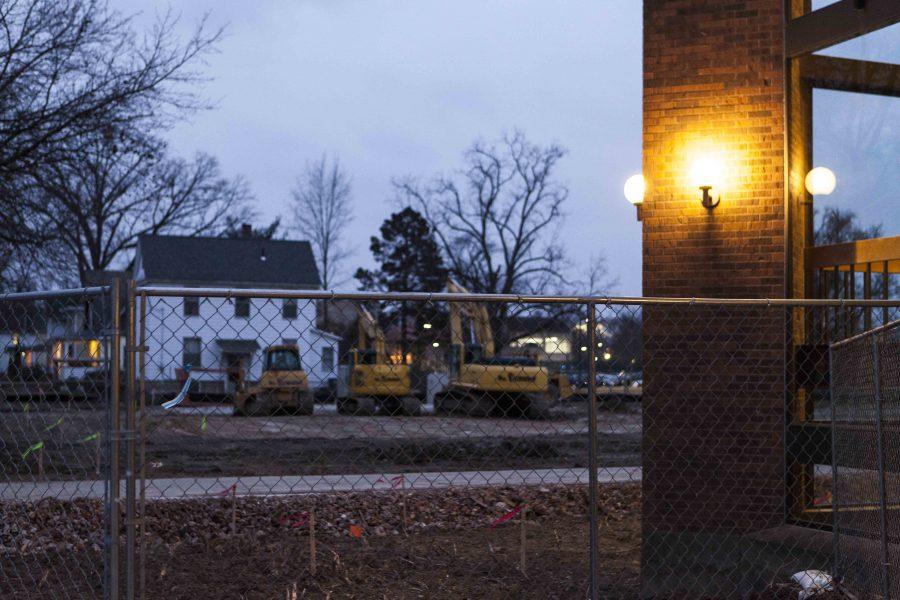Trustees Decline to Add Student Representative
Photo by Bryan Rubin, Photo editor
Diggers at the Philips gym expansion site lie idle Thursday. Student activists pushing for student representatives on the board hope that future capital planning decisions will account for student input.
December 9, 2016
Student Senate’s dream of having a student representative at Board of Trustees meetings may have ended Tuesday after trustees rejected the group’s proposal.
“The board very much values engagement with students, and we believe Oberlin can be strengthened by all of us understanding better all the various roles and responsibilities involved in institutional governance,” the trustees wrote in an email to Senate. “For a number of reasons, the board is not, at this point, prepared to have student representatives at its full board meetings. But we do very much want to understand and, if possible, address the variety of underlying issues raised in the May letter.”
Still, many student activists said they felt hopeful because of the board’s apparent willingness to engage in a conversation about strengthening communication between students and trustees. The board met with Student Senate in private on Thursday to discuss campus issues, including student representation and to plan a Senate-board retreat next semester. Notably, for the first time in years, the board is not running a student-trustee forum during its on-campus meeting this weekend.
Former Student Senate Liaison and double-degree senior Jeremy Poe, who wrote the letter to the board requesting student representatives last spring, said the board’s response did not come as a surprise.
“We’re suggesting something outside of their comfort zone,” Poe said. “Our job is then to confront that uncomfortability, explore it, ask why and then say: ‘We’re uncomfortable not having student reps,’ and then say, ‘Let’s figure this out.’”
College junior and Student Senator Jesse Docter said he was “disappointed” with the board’s decision.
“I think that there’s no replacement for having direct student representation on the Board of Trustees,”
Docter said. “The larger problem is that there needs to be direct accountability and communication between the Board of Trustees and students. We’ve illustrated how the board has made decisions that have been poorly informed — they haven’t had direct lines of communication with the student body.” Poe said he sees the issue as a way of placing students as political actors in the community as opposed to passive consumers. He also declined to comment on anything regarding the Presidential Search Committee, of which he is the student representative, citing a confidentiality agreement.
“A central part of student reps is letting students into the room and changing our normative assumptions about what students are supposed to be involved in at this school,” Poe said. “It’s moving past a belief that students are customers which as an analogy officers no form of political participation for students.”
Not every student activist believes that having student representatives on the board is the best or only way to strengthen communication. College sophomore and Student Senate Communications Liaison Kameron Dunbar stated that while he’s not opposed to the idea of student representatives on the board, one-on-one conversations between students and trustees could be more effective.
“I’ve found that you can make a lot more of an impact when talking to specific people who are knowledgeable about the specific issue you’re looking at,” Dunbar said. “For example, having students regularly engage with different trustees on the committees I think could be useful.”
Student activists are also examining other models such as Scripps College to get ideas on how to deepen student involvement in College governance said College sophomore and Student Senator Meg Parker.
“They have a group of students who meet with the Board of Trustees on campus for a series of meetings before they make the decisions, so that students are aware of the decisions that are going to be made and can voice their opinions to the board,” Parker said. “They don’t have voting power, but it does allow for some other forms of discourse.”
For Dunbar, the “us vs. them” mentality that many students have toward the board is counterproductive.
“All the trustees are Obies too,” Dunbar said. “They’re all alumni in the end, and I do think that they have Oberlin’s — and dare I say students’ — best interests in mind, even if they don’t always make the right choice, or what we think is the right choice.”
Vice President and General Counsel Sandhya Subramanian, acting on behalf of the board, declined to comment on the decision.

























